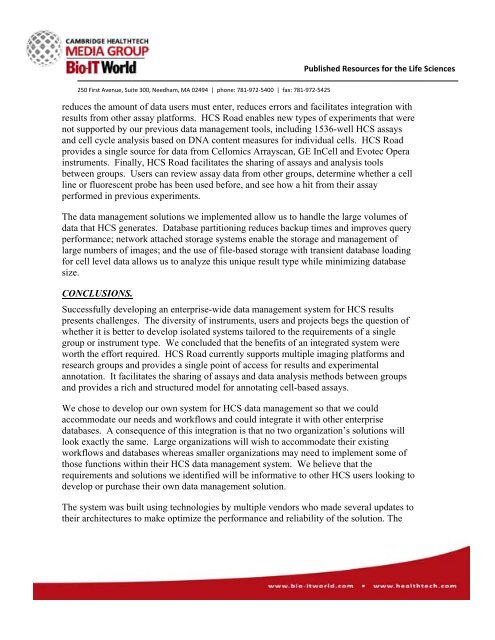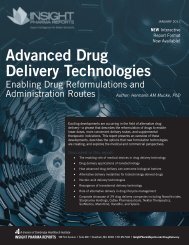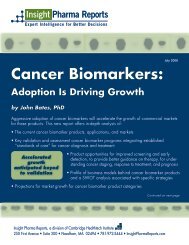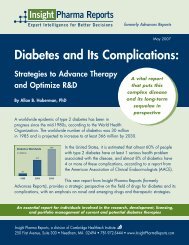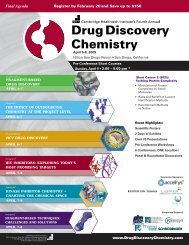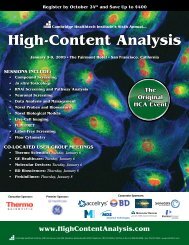2010 Best Practices Competition IT & Informatics HPC
IT Informatics - Cambridge Healthtech Institute
IT Informatics - Cambridge Healthtech Institute
- No tags were found...
Create successful ePaper yourself
Turn your PDF publications into a flip-book with our unique Google optimized e-Paper software.
Published Resources for the Life Sciences<br />
250 First Avenue, Suite 300, Needham, MA 02494 | phone: 781‐972‐5400 | fax: 781‐972‐5425<br />
reduces the amount of data users must enter, reduces errors and facilitates integration with<br />
results from other assay platforms. HCS Road enables new types of experiments that were<br />
not supported by our previous data management tools, including 1536-well HCS assays<br />
and cell cycle analysis based on DNA content measures for individual cells. HCS Road<br />
provides a single source for data from Cellomics Arrayscan, GE InCell and Evotec Opera<br />
instruments. Finally, HCS Road facilitates the sharing of assays and analysis tools<br />
between groups. Users can review assay data from other groups, determine whether a cell<br />
line or fluorescent probe has been used before, and see how a hit from their assay<br />
performed in previous experiments.<br />
The data management solutions we implemented allow us to handle the large volumes of<br />
data that HCS generates. Database partitioning reduces backup times and improves query<br />
performance; network attached storage systems enable the storage and management of<br />
large numbers of images; and the use of file-based storage with transient database loading<br />
for cell level data allows us to analyze this unique result type while minimizing database<br />
size.<br />
CONCLUSIONS.<br />
Successfully developing an enterprise-wide data management system for HCS results<br />
presents challenges. The diversity of instruments, users and projects begs the question of<br />
whether it is better to develop isolated systems tailored to the requirements of a single<br />
group or instrument type. We concluded that the benefits of an integrated system were<br />
worth the effort required. HCS Road currently supports multiple imaging platforms and<br />
research groups and provides a single point of access for results and experimental<br />
annotation. It facilitates the sharing of assays and data analysis methods between groups<br />
and provides a rich and structured model for annotating cell-based assays.<br />
We chose to develop our own system for HCS data management so that we could<br />
accommodate our needs and workflows and could integrate it with other enterprise<br />
databases. A consequence of this integration is that no two organization’s solutions will<br />
look exactly the same. Large organizations will wish to accommodate their existing<br />
workflows and databases whereas smaller organizations may need to implement some of<br />
those functions within their HCS data management system. We believe that the<br />
requirements and solutions we identified will be informative to other HCS users looking to<br />
develop or purchase their own data management solution.<br />
The system was built using technologies by multiple vendors who made several updates to<br />
their architectures to make optimize the performance and reliability of the solution. The


